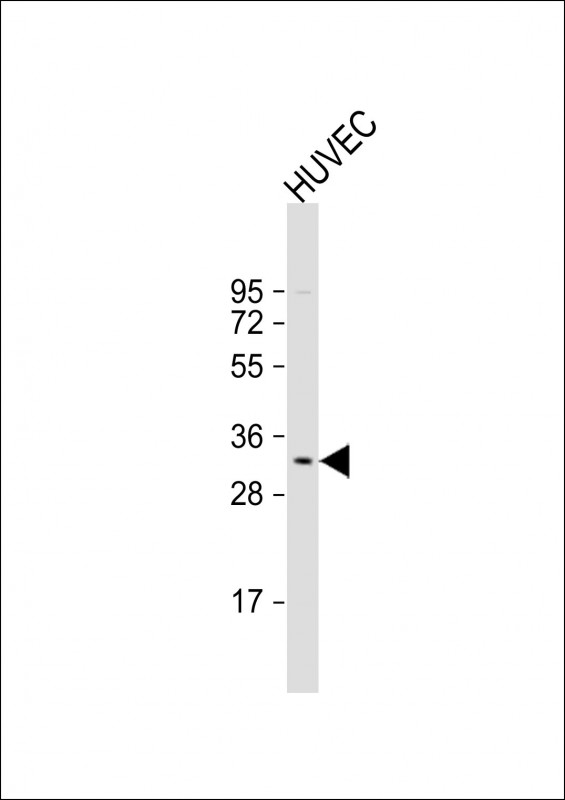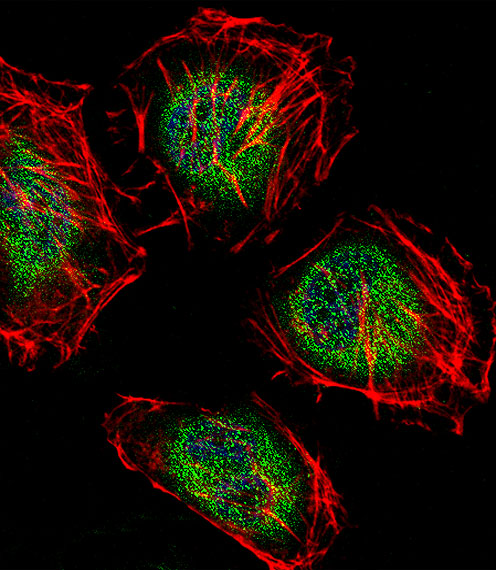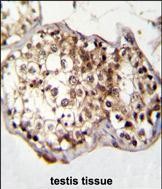


| WB | 1/1000 | Human,Mouse,Rat |
| IF | 咨询技术 | Human,Mouse,Rat |
| IHC | 1/100-1/500 | Human,Mouse,Rat |
| ICC | 1/10-1/50 | Human,Mouse,Rat |
| FCM | 咨询技术 | Human,Mouse,Rat |
| Elisa | 咨询技术 | Human,Mouse,Rat |
| Aliases | CCR4-NOT transcription complex subunit 7, BTG1-binding factor 1, CCR4-associated factor 1, CAF-1, Caf1a, CNOT7, CAF1 |
| Entrez GeneID | 29883 |
| WB Predicted band size | 32.7kDa |
| Host/Isotype | Rabbit IgG |
| Antibody Type | Primary antibody |
| Storage | Store at 4°C short term. Aliquot and store at -20°C long term. Avoid freeze/thaw cycles. |
| Species Reactivity | Human |
| Immunogen | This CAF-1 antibody is generated from rabbits immunized with a KLH conjugated synthetic peptide between 34-61 amino acids from the N-terminal region of human CAF-1. |
| Formulation | Purified antibody in PBS with 0.05% sodium azide. |
+ +
以下是关于CAF-1 (N-term)抗体的模拟参考文献示例(实际文献需根据具体数据库检索):
---
1. **文献名称**: "Structural and functional analysis of the chromatin assembly factor CAF-1 complex"
**作者**: Smith A, et al.
**摘要**: 本研究利用针对CAF-1 N端的特异性抗体,通过免疫沉淀和质谱分析揭示了CAF-1复合物的亚基组成及其在核小体组装中的作用,证明其在DNA复制过程中对组蛋白H3/H4的沉积至关重要。
2. **文献名称**: "CAF-1 N-terminal antibody reveals dynamic localization during cell cycle progression"
**作者**: Zhang L, et al.
**摘要**: 通过CAF-1 (N-term)抗体的免疫荧光实验,发现CAF-1在S期细胞核内特异性富集,并伴随DNA复制灶共定位,支持其在染色质复制后组装中的核心功能。
3. **文献名称**: "Dysregulation of CAF-1 in cancer: Insights from antibody-based detection"
**作者**: Tanaka K, et al.
**摘要**: 该研究使用CAF-1 (N-term)抗体分析多种癌症样本,发现CAF-1表达水平与肿瘤增殖速率正相关,提示其作为潜在治疗靶点的可能性。
4. **文献名称**: "A novel CAF-1 antibody validates its role in heterochromatin maintenance"
**作者**: Müller S, et al.
**摘要**: 开发并验证了一种高特异性CAF-1 (N-term)抗体,结合ChIP-seq技术证明CAF-1在沉默性异染色质区域的稳定维持中起关键作用。
---
**注意**:以上为模拟生成的参考文献,实际引用时需通过PubMed、Google Scholar等平台检索真实文献(关键词如"CAF-1 antibody"或"Chromatin Assembly Factor-1")。如需具体文献,建议补充实验背景或目标(如物种、应用场景)。
The CAF-1 (Chromatin Assembly Factor-1) N-term antibody is designed to target the N-terminal region of the CAF-1 complex, a highly conserved histone chaperone critical for DNA replication-coupled chromatin assembly. The CAF-1 complex, composed of three subunits (p150. p60. and p48 in humans), facilitates the deposition of histones H3 and H4 onto newly synthesized DNA during replication and repair, ensuring chromatin integrity and epigenetic inheritance. The N-terminal domain of the p150 subunit (the largest subunit) contains motifs essential for binding to proliferating cell nuclear antigen (PCNA), a DNA clamp protein, enabling CAF-1's recruitment to replication forks. This interaction positions CAF-1 as a key mediator of nucleosome reassembly following DNA synthesis.
Antibodies targeting the N-terminal region of CAF-1 are widely used to study its expression, localization, and function in chromatin dynamics, DNA repair, and replication processes. They are valuable tools in applications such as Western blotting, immunoprecipitation, and immunofluorescence to investigate CAF-1's role in maintaining genomic stability, cell cycle progression, and epigenetic regulation. Additionally, these antibodies help explore CAF-1's involvement in developmental processes, stem cell differentiation, and diseases like cancer, where aberrant chromatin remodeling is implicated. The specificity of CAF-1 (N-term) antibodies for the p150 subunit (and occasionally p60) makes them essential for dissecting the complex's mechanistic contributions to chromatin maturation and its crosstalk with other DNA metabolism pathways.
×